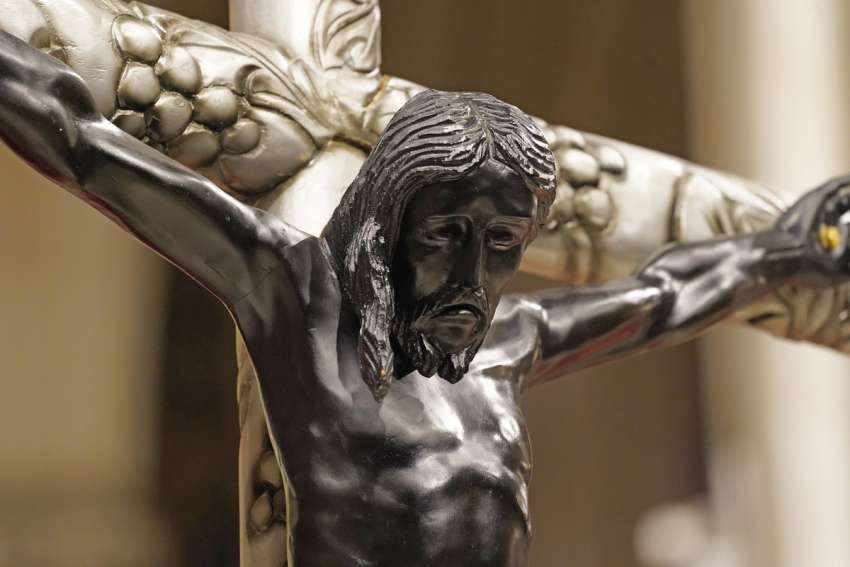The simple slogan “He is risen!” carries it all, and partaking in the life of the eucharistic Church community renews us day by day, moment by moment. Here the real presence of Christ is made tangible.
Nor do we have to make the Resurrection happen. It has happened, God’s work not ours. Ours is to accept it, make it known and — strange as it may seem — use it. It’s as real as earthworms aerating the garden, yeast raising the bread, breath enlivening our bodies. If this isn’t so, then the Resurrection is merely an idea or thought; nothing to base one’s life on, let alone risk one’s death.
How do we “use” the Resurrection? Christians have demonstrated the answer for us, from earliest days to our time. We use the Resurrection by the way we pick up the Cross.
In Roman times, the cross was the empire’s weapon against its subjugated peoples — a highly effective one, skillfully honed to extract maximum torture and evoke utmost terror. The people might fight back, but — like arrows against armoured tanks — their greatest efforts were puny before the might wielded against them. Mercilessly controlled, they had no hope of capturing or duplicating its weapons, or acquiring bigger weapons, to use against Roman power in quest of freedom.
Jesus picked up the Cross in innocence and vulnerability and transformed into a weapon of a different sort, a weapon not against other people but against the power of evil itself. Jesus did not oppose the Cross but changed it. By reworking death, He also reworked the fear of death. He inaugurated, not a new army or technology, but a community, fed by His body and blood, gathered by the Holy Spirit, belonging to one Father and participating in the divine life.
Following Jesus, Roman oppression was challenged, but not by seizing control of the Roman weapon of crucifixion or inventing a bigger, better super-weapon. Christians within the empire wielded another kind of power, for a different purpose. An influential example occurred when Rome itself was overtaken, not by a powerful army, but by the power of infectious illness. Christians, even wealthy ones who had the means of escape, didn’t flee in self-protection. Rather, they stayed with the sick to feed and tend them — not only sick Christians, but sick people of any faith. Bishop Cyprian of Carthage urged them to see the plague, not as a punishment by God, but as a naturally-occurring ill which required a response of love. Faith, he saw, doesn’t lift people out of life’s difficulties, but rather gives them a different way of being in them: the way of Christ the healer, who offers life to all.
“The Cross,” wrote Joseph Studite, “is our weapon for our salvation.” The most powerful of human weapons, cruelly devised to enslave other humans, becomes the weapon we can pick up, not to gain the power of terror and violence, but for the power of faith and forgiveness. Not for the purpose of harming others, but for the purpose of healing all. The Cross has been so used, in small ways and great, and is being so used even now.
In a city in my country, the oldest Catholic parish honours the grave of the city’s first Catholic bishop. He died at 42 from typhus, because rather than accepting the plan of refusing entry to immigrants arriving with the disease, he himself met them with physical and spiritual nourishment.
Once in a small urban parish, during Eastertide, a parishioner went out during the service, because some young men in the parking lot were throwing things at the church windows. Soon after, the sounds of projectiles hitting windows stopped. When he returned, someone whispered to the man who’d gone out: “What did you do, threaten to call the police?” “No,” he responded, “I asked them to stop their game and join us after church for cheesecake.”
More recently, in another country, where citizens were offered an illusory vote in an election with only one possible outcome, a Christian encouraged them to all arrive at the same time for the vote. This offered a small action everyone could do, not changing the immediate result but showing they were not alone. It revealed the community that carries the power of the divine Healer.
The Resurrection does not take away the Cross. It teaches us how to use the Cross.
(Marrocco can be reached at mary.marrocco@outlook.com.)

